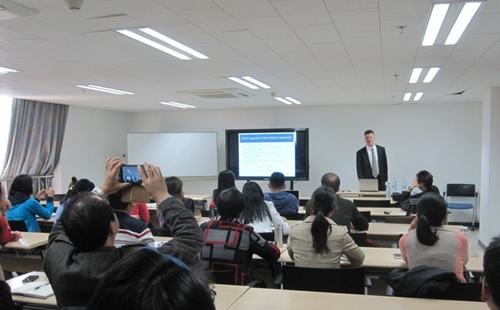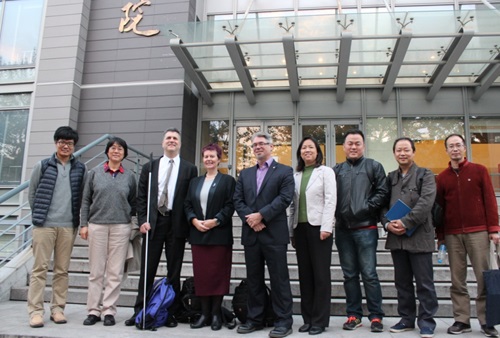

Professor Robert Greenberg Talks at Peking University11/10/2015¯At the invitation of the New Zealand Centre and the Institute of Foreign Linguistics and Applied Linguistics at Peking University, Professor Robert Greenberg, Dean of the Faculty of Arts at the University of Auckland, delivered a lecture titled “Language Planning and Language Policy: Evidence from Europe, New Zealand, and North America” at Peking University.
At the invitation of the New Zealand Centre and the Institute of Foreign Linguistics and Applied Linguistics at Peking University, Professor Robert Greenberg, Dean of the Faculty of Arts at the University of Auckland, delivered a lecture titled “Language Planning and Language Policy: Evidence from Europe, New Zealand, and North America” at Peking University on October 23. His lecture was well attended and warmly welcome by more than thirty faculty members and graduate students and visiting scholars. Professor Greenberg began his lecture by paying tribute to Professor Edward Stankiewicz, saying that his lecture at Peking University was a “dream planted in the 1990s” when his mentor Professor Stankiewicz gave a similar lecture, so his lecture was in a way to continue Professor Stankiewicz’s “important legacy in linguistics and in Slavic Linguistics”.

Professor Greenberg delivering his lecture, School of Foreign Languages. In his lecture, Professor Greenberg explored the theoretical premises and issues of language policy, and examined case studies from North America (Canada and United States), Europe (Belgium and the United Kingdom) and New Zealand. He discussed the top-down approach towards language planning and policies, which centers on how states manage language conflicts and language policies, what challenges are facing different types of states, and how states deal with issues of language, identity, nation and minority groups. He also elaborated on how social groups interact with states and influence the implementation of language policies from bottom-up. Professor Greenberg argued that language is the key marker of a social group identity. While recognizing the existence of a continuum in state linguistic models, from exclusion, to pluralistic and to linguistic confederation, Professor Greenberg argued that language ideologies and a nation’s accommodation principles also interact with different linguistic models. In particular, as a tolerant model, the pluralistic model in Europe meant that to “preserve the wealth of languages is the preservation of the wealth of European culture, heritage and society”. He fully acknowledged New Zealand’s constructive effort in promoting the Mori language in the nation.

Professor Greenberg with Faculty outside the School of Foreign Languages. His lecture was concluded by highlighting that perceived shifts in language policy can reduce or inflame tensions within the state. Different nation-states and multinational states have different language policies; those nations in Eastern Europe and the former Soviet Union have to deal with political and social controversies of minority languages. Professor Greenberg’s lecture was enormously successful and inspiring, not only presenting a multi-dimensional world tour concerning the issues of language planning and policies, but also igniting the audience’s enthusiasm in paying more attention to such language issues emerging in China. - the above article was provided by Guoyan Lu |